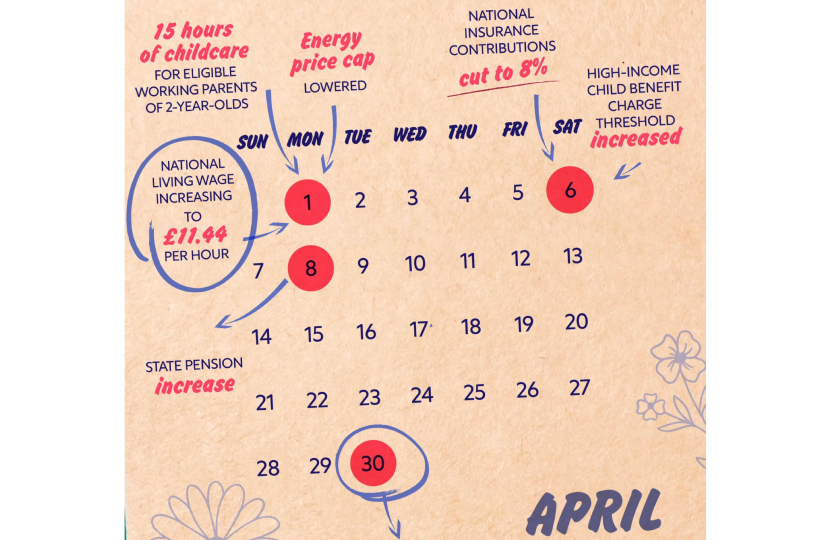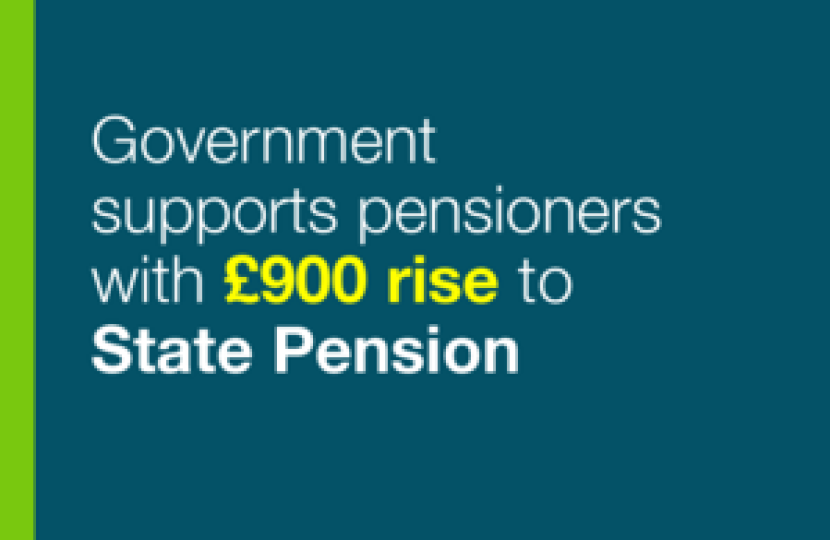Thousands of households across Castle Point are set to be around £3,850 better off as a raft of economic policies come into force.
Rebecca said; "This Conservative Government is on the side of hard working families and has provided record cost-of-living support through Covid and the energy price spike following the war in Ukraine. I am pleased that the latest economic reforms will mean a family in Castle Point will be thousands of pounds better off, thanks to our careful economic management and work to reduce inflation."
The National Living Wage has officially risen from £10.42 an hour to £11.44, meaning no full-time worker over 21 will earn less than two-thirds of the average hourly wage. This marks a £1,800 annual boost to their pay packet – delivering a manifesto commitment to eliminate low pay.
Households will also save around £250 a year on average thanks to a drop in energy bills introduced by Ofgem today. This marks a 12.3% fall from the previous quarter, which brings prices down to their lowest since Russia’s invasion of the Ukraine in February 2022.
An increase to the Local Housing Allowance, also introduced today, means some of the poorest families on either Universal Credit or Housing Benefit will gain around £800 a year on average.
That runs alongside the roll out of 15 hours of free childcare, which will save working parents an average of £3,450 a year – the first stage in the £8 billion childcare package that was announced by the Chancellor last year. The High Income Benefit Charge Threshold will also rise from £50,000 to £60,000 and will be tapered out until someone earns £80,000 - a huge tax cut for working families.
The six-month extension to the Household Support Fund also starts – backed by £500 million - to give vital, targeted support to millions of vulnerable households across England. The fund has previously been used to help with water bills, provide health visits, disabled children services, free school meals and more.
The State Pension is increasing by 8.5% as part of the Government’s commitment to support pensioners in retirement. It comes on the heels of the highest ever cash increase to State Pension in history of 10.1% last year, plus a package of support for pensioners this winter worth nearly £5 billion. Pension Credit, a passport benefit to provide additional support for low-income pensioners, will also see a significant rise, with the average award worth over £3,900. Underlining the Government’s commitment to backing Britain’s pensioners, this means pensioners receiving the full new State Pension will get an extra £900 a year from today. The full yearly basic State Pension will also be £3,700 more than in 2010, while the full rate of the new State Pension will be over £11,500 a year.
The Government is cutting the main rate of National Insurance by 2p from 10% to 8%, saving the average worker over £900 a year. The Government is also cutting a further 2p from the main rate of self-employed National Insurance, this means the main rate of Class 4 NICs for the self-employed will now be reduced from 9% to 6%, saving an average £650 a year.
Meanwhile, tax cuts to SMEs and the UK film industry will start benefitting firms up and down the UK to help drive growth in the economy. This includes increasing the VAT threshold for small businesses, slashing business rates for high street businesses, funding apprenticeships, and igniting the British film industry with a 10 year tax relief. This bumper package of measures are coming into force today will fire up businesses and push the UK further into this new economic moment which sees Britain bouncing back.
The last few years have not been easy for the UK economy – the legacy of Covid, and global instability have tested financial systems across the world. Since the beginning of 2023, the Prime Minister has been working on five priorities – three of which were economic: to halve inflation, grow the economy and reduce debt. This has been achieved – and given us the headroom to deliver today’s package and slash the average workers taxes by £900 a year. This puts the UK in a strong position to achieve the long-term ambition to abolish NICs entirely. This will put an end to the unfair system which means workers are taxed twice for the same work – NICs and Income Tax.
The Prime Minister, Rishi Sunak, said: "Today’s measures could save households around £3,850 year on average which – taken with the upcoming cuts to NICs – will put more money in their pockets to help ignite the economy. Although recent years have tested our resolve, we have not bowed. We have stuck to the plan, more than halved inflation, and set us on a path to growth. Because of this determination, we find ourselves in a new economic moment and – thanks to our bumper package of economic reforms coming into force today – 2024 is set to be the year Britain bounces back."
Chancellor of the Exchequer Jeremy Hunt said: "Today we are addressing low hourly pay, with increases for people earning the National Living Wage worth £1,800 to a full time worker. It’s part of our plan to reward work which is why we’re also cutting National Insurance and delivering on our promise of more free childcare. All paid for by our progress in getting the economy back on track."


